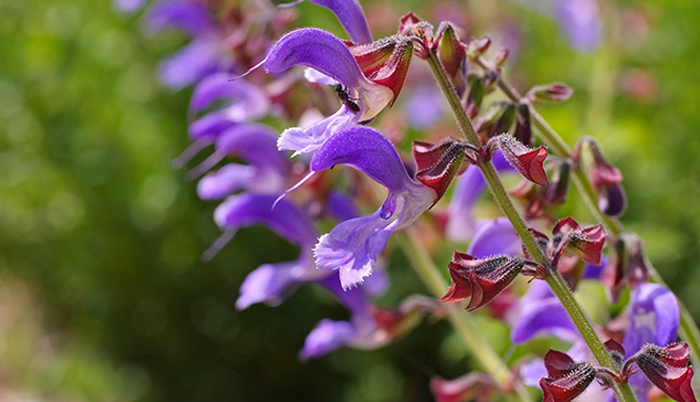![]() Home > Lifestyle
Home > Lifestyle
Thought Of As A Weed, Research Shows Wild Clary (Wild Sage) Protects Red Blood Cells

![]() August 30th, 2018 | 09:54 AM |
August 30th, 2018 | 09:54 AM | ![]() 395 views
395 views
NATURALNEWS.COM
Researchers from Algeria have set their eyes on wild clary, a plant that is native to Europe and northern Africa, to unlock its potential therapeutic effects.
The paper, published in the African Journal of Traditional, Complementary and Alternative Medicines, studied the protective effect of the plant on red blood cells, its role in preventing the increase of excess uric acid, as well as its antioxidant and antimicrobial properties.
The wild clary plant (Salvia verbenaca L.) is one of the most popular herbal treatments in Algerian traditional medicine. In particular, wounds are treated using the areal part of the plant – a method that is also used in other regions such as Morocco. Studies have shown that the salvia species contain phenols, compounds that contain multiple health benefits. These benefits include decreasing the likelihood of certain cancers and promoting healthy aging. Other bioactive compounds can also be found in wild clary like phenolic acids and flavonoids. Wild clary, in particular, contains caffeic acid, carnosic acid, kaempferol, oleanolic acid, rosmarinic acid, and ursolic acid. These function as antioxidants which help prevent or delay cell damage.
For the study, the research team sought to assess the wild clary’s potential to be an antioxidant, antihemolytic and antimicrobial agent, as well as its capacity to be an enzyme modulator.
Researchers used the areal part of the wild clary plant in order to create an aqueous extract for the study. The extract was then analyzed to understand its total phenol and flavonoid content. To check for its antihemolytic property, researchers extracted blood from mice to be used for testing. The samples were given 2,2,-azobis (2-amidinopropane) dihydrochloride (AAPH), a chemical that can cause red blood cell damage, but random blood samples were also injected with the wild clary extract. Samples were then incubated at 37 degrees Celsius (to replicate the temperature of a human body) for over four hours.
Aside from this, the wild clary extracts were tested if they were able to inhibit xanthene oxidation, which is a key process in the production of uric acid. While uric acid naturally occurs after digestion, a high uric acid level in the body causes it to crystallize at the joints, prompting a painful condition called gout. Moreover, the extract was also tested for its antioxidant and antifungal properties. To determine its antibacterial capacity, the extract was tested against harmful bacteria such as Escherichia coli, Staphylococcus aureus, and Salmonella typhi, among others.
The study found wild clary has potential pharmacological properties. To note, the researchers wrote: “The present study is a report demonstrating that the extract from S. verbenaca areal part and its four different solvent sub-fractions have antihemolytic, antioxidant and antibacterial activities.” They suggested that this is because of the presence of bioactive components with strong antioxidant properties such as phenolics, flavonoids, and tannins. This also could be the reason for wild clary’s ability to prevent red blood cell damage and cell destruction from free radicals. Moreover, results showed the wild clary extract was able to ward off pathogenic bacteria strains such as E. coli, S. aureus, and S. typhi.
The wild clary extract was also found to inhibit uric acid production depending on the dosage. The study identified this phenomenon to be caused by phenolic compounds that are available in plant extracts that bind itself to xanthine. Researchers posited that this could be further studied in order to provide alternative medicine to synthesized inhibitors that have serious side effects.
The study, titled Investigation of antihemolytic, xanthine oxidase inhibition, antioxidant and antimicrobial properties of Salvia verbenaca L. aerial part extracts, was published by researchers from the University of Setif in Algeria.
Source:
courtesy of NATURALNEWS
by Ralph Flores
If you have any stories or news that you would like to share with the global online community, please feel free to share it with us by contacting us directly at [email protected]